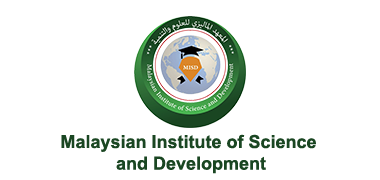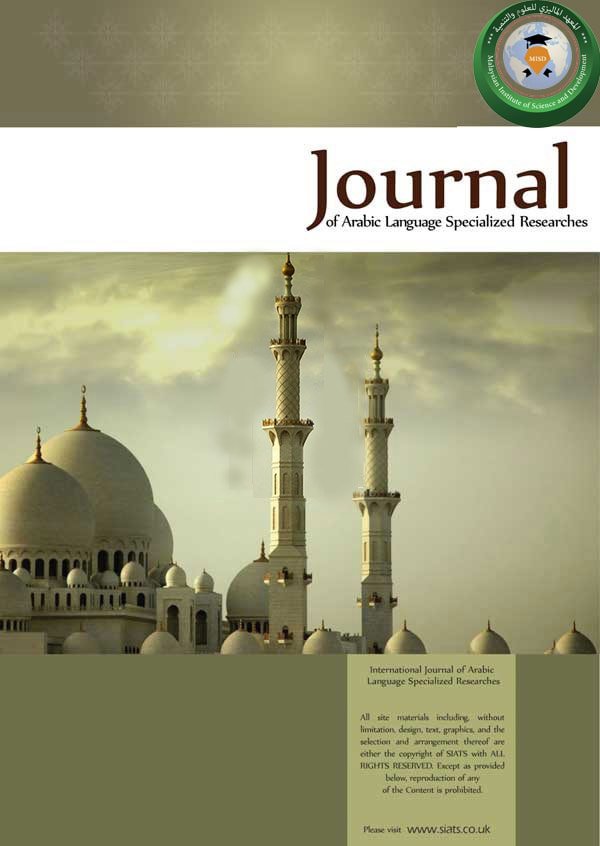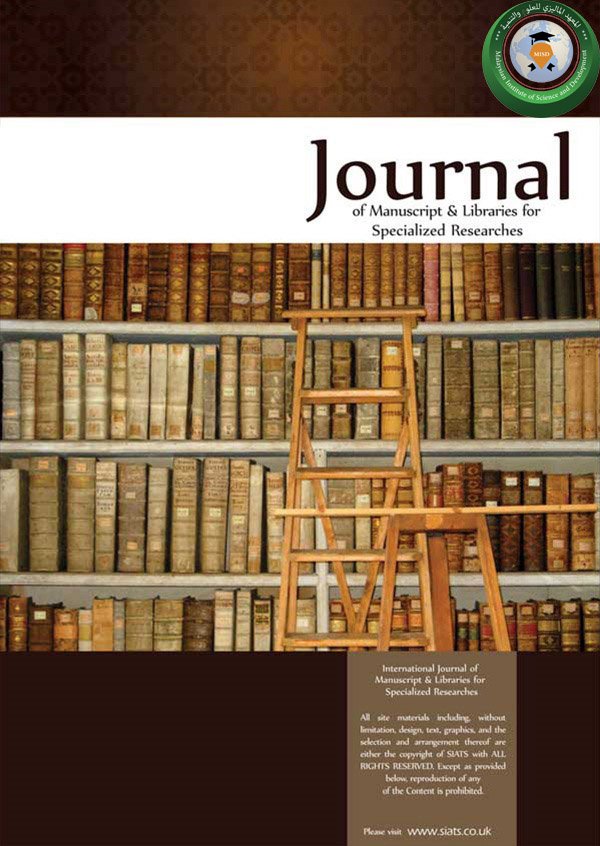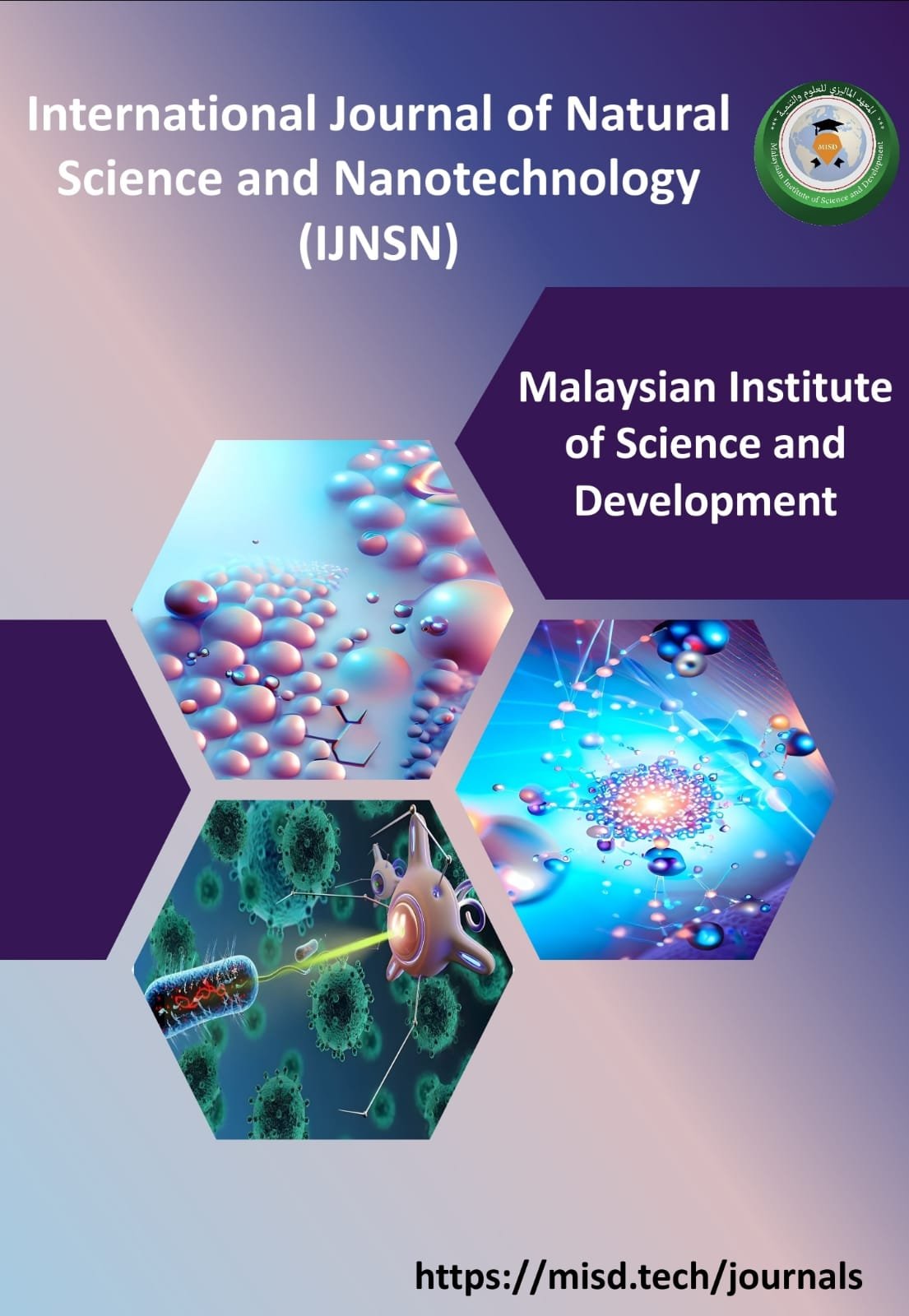- LATEST
-
- constructivist theory in international relations and its advantages
- renewal and renewers in islam
- genius of hadith scholars in the selection process and its impact on the purification of the prophet's sunnah
- the role of rhetorical and grammatical methods in depicting spiritual meanings in the quran: an analytical study
- the efforts of sheikh abdul majeed al-zindani in the science of tawhid and faith (creed)
- environmental influence on hermeneutical construction: a grounded and applied approach
- the principles by which imam muhammad bin sereen relied upon to set his opinions and jurisprudence rules through a book of almoghni for ibn qudama
- the theory of statement according to imam al-shafi’i compared to ibn hazm and its impact on establishing evidence
- symbolism in the holy qur’an : an interpretive reading of the symbols of the serpent , crow , ram and cow
- preventive settlement procedure in the saudi system and amicable settlement in french law
- theory of sovereignty acts and its contravention of the principle of legality: a comparative analytical study in the saudi and egyptian systems
- verses abrogated in sahihs (bukhari and muslim) analytical study
- earthquakes from a nodal perspective an analytical study
- installment sales from the perspective of islamic jurisprudence and law
- the verbal significance between establishment and affirmation and its impact on the jurisprudential controversy
- arbitration in sports disputes
- the necessity of life preservation and it’s implication in family law 1991”sudan”
- the effect of retracting the jurist his opinion in the maliki’s madhhab
- contemporary advocacy discourse and its impact on glorifying the sunnah of the prophet through pulpit sermons
- consumer guarantees in e-commerce according to the uae legislation
- alterative medical disputes resolution
- the status of charitable in islamic legislation
- characteristics of the kharijites and their rule in islamic law and their danger to islam and muslims
- jurisprudential imitation of charitable events: a study of selected examples
- the opponents of islamic fiqhnon-madhhabis: from the book of the attitude of the mind and science
- sayyid quṭb's view on the quranic methodology in human and civilization development in his book fi Ẓilāl al-qur’ān: a thematic study
- characteristics of the kharijites in the six books of the hadith of the prophet
- uae checks law issued by federal decree-law no. 14 of 2020 amending some provisions of the commercial transactions law promulgated by federal law no. 18 of 1993 analytical critical study
- study the saying of sheikh al-albani in his authentic series on some narrators (i did not know him) and they are well known
- grief and abuse as it came in the holy qur'an - analytical study "corona's cloud is a model"
- research on social solidarity in islamic jurisprudence (sponsoring an orphan as a model)
- graphic interpretation of the holy quran
- the religious idea and its role in cultural stability
- the religious extremism in human thought a systematic approach in concepts and causes
- qdaya alshh alanjabyh almt'elqh baltfl wmqasdha alshr'eyh
- qdaya alshh alanjabyh almt'elqh baltfl wmqasdha alshr'eyh
- the role of the nation's scholars through the fatwa in general calamities corona as a model
- the role of the nation's scholars through the fatwa in general calamities corona as a model
- the societal impact of contemporary atheism and the challenges facing with muslim indiviual
- the societal impact of contemporary atheism and the challenges facing with muslim indiviual
- the reality and prospects of digital "fintech" financial services in the banking sector.
- qualities and ethics of a doctor between past and present, a forensic historical study
- the correlation between the jurisprudence of reality and the jurisprudence of anticipation
- political strategy and military plans in islamic legislation (examples from the qur’an and sunnah)
- treatment of dhimmi in the maliki madhab: a study of chosen jurisprudential issues
- the effectiveness of professor dr. jawad ali in the historical writing
- blockchain technology and it's effects on modern financial transactions: an islamic jurisprudential study
- the manifestations of the scientific renaissance in the tihama of yemen and its impact on the shariah sciences
- what arrafi'i and annuwawi has agreed on weighting in the book of aljinayat, walhudud, wal'aqdaya, walshahadat, wal'iqrar
- hadiths mentioned in the eating of a hyena, an analytical study
- a document telling the magnificence of the will
- the range of practising the educational supervisors for main types of educational supervision in basic education schools in al-wusta governorate in sultanate of oman
- tolerance for sectarian differences between muslims in the perspective of his eminence sheikh ahmed al-khalili, mufti of the sultanate of oman
- the seduction and its impact in fueling the sexual arousal and the way of countering it an analyzing study in surat yusuf
- sheikh al-gilani's approach in contractual issues
- islamic values and their role in promoting human values to develop society with a model of the role of king abdulaziz university in promoting moral values
- qur’an in the heritage interpretations and contemporary interpretations: an integration of naqli and aqli approach
- the benefits of governance and the importance of applying it in the ministry of education, sultanate of oman
- the place from which the prophet was taken to the heavens
- intimidation and its impact on the security of the individual and society
- scientific evidence in criminal prove: an analytical study
- husul almamul bimaerifat eadalat wadabt alrawat fi alhadith almaqbul (alturuq waldawabit walmasadr)
- the impact of the training program evaluation indevelopment the job performanceusing kirkpatrickmodel: a field study in dhofar municipality
- the applications of the shari’ah contracts regulating the investment a study at al-rajhi takĀful company
- the education role in developing the citizenship values among (10-12) grades students in the province of north batinah sultanate of oman
- challenges of the libyan political system due to the legislative and executive authorities: a study of political system principl
- transformational leadership’s relations with organizational health in basic education schools in the sultanate of oman.
- training needs for directors of post-basic schools in the sultanate of oman in the field of vocational guidance
- regulations governing the mosques and holy quran schools work at the ministry of awqaf and religious affairsin the sultanate of oman: descriptive study
- the role of organizational excellence in improving the quality of services in service organizations operating in dhofar sultanate of oman: study in oman telecommunications company (omantel)
- the impact of career rotation on the stability of employees in the ministry of education in the sultanate of oman
- mechanisms for the application of international humanitarian law at the international level:analytical descriptive study
- the level of human rights awareness relation to self-confidence among sultan qaboos university students in the sultanate of oman
- the impact of talent management on organizational innovation applied study on sohar university – sultanate of oman
- the methodology of philips in measuring the return on investment and its applications in the training of human resources in the ministry of education sultanate of oman
- leadership abilities of post-primary school principals: a teachers’ perspective of buraimi governorate, sultanate of oman
- the “kreider” strategy for cooperative and technical learning’ role in the collection of the tenth grader students in social studies at the sultanate of oman
- adam’s justice theory and organizational justice, dimensions and rules: an analytical descriptive study
- alqawaeid almanhajiat fi dawabit almudara
- faqih alttwazn alddewy wadawrih fi najah alkhatabat alddewy.
- marawiat muhamad bin yusif alfariabiu almueilat bialaikhtilaf ealayh fi kitab alealal liaibn 'abi hatim - dirasat naqdiatan -
- madaa 'iiqbal tlbt diblum altaelim aleami fi madaris muhafazat janub albatinat bisaltanat euman ealaa dirasat altaelim alshareii
- qadih alnaqd eind al'usuliiyn
- al'usrat eawamil albina' waeawamil alhdm: min manzur 'iislamiin
- khms fawasiq yaqtuln fi alharam dirasatan hadithiatan faqahiatan
- wajibat alllajiiyn fi alqanun alduwalii min manzur alshryet al'iislamiat - dirasatan mqarn
- altaasil alshareiu lilwasatiat fi al'islam
- kutib alssunt waeulumuha alty aetanaa biha eulama' najid khilal alqarnayn alththalith walrrabie eshr alhajariiyn
- alsakinat fi alquran wa'athariha ealaa alqulub almutasifat bial'iiman - dirasatan mawdueiatan -
- 'athara 'iisdarat alsukuk al'iislamiat alsiyadiat ealaa 'asear alsirf
- al'imam albyhqy makanatuh aleilmiat walkhasayis almanhajiat likitabih alsunn alkubraa
- hakam altamthil alsiynamayiyu fi alfaqih al'iislamii
- full-journal
- marahil almaswuwliat aljinayiyat lilhadath fi alqanun aleumanii ealaa daw' alshryet al'iislamiat walqanun alduwalii
- mukafahat altajasus al'iiliktrunii fi alshryet al'iislamiat mqarnaan bialqanun alduwalii
- shurut alshaykh al'albaniu fi alhukm ealaa al'ahadith almawqufat bialrafe
- albitalat wa'athariha ealaa khariji aljamieat wal'asr fi baladiat turaghin alliybiat: dirasat min manzur alshryet al'iislamia
- "alzinat walzakhrifat fi alquran alkarim"
- altatbiqat alfaqhiat lilqias eind al'imam 'abi hanifat alnaeman (rhamh allah taealaa)
- altahafuz ealaa mueahadat huquq al'iinsan bayn mawqif alshryet al'iislamiat walfaqih alduwalii
- 'iishkaliat altadakhul alduwalii wamabda alsyadt: dirasat bihathyh bayn alqanun alduwalii walsharieat al'iislamia
- alaistishfa' bialquran alkarim walsanat alnubawiat fi almadinat almunawara (2)
- full-journal
- al'usul alsabeat alty 'arsaha eabd alqadir aljylany
- al'iishkaliat almufahimiat waltathylyt limustalah alaistishraq - dirasatan lil'ansaq almudmirat aleanifat wa'iibdae lilmustalah
- ?kayf nartaqi bi'anfusina fi ramadan wama baedah
- athara almudhahab alfaqhiu ealaa altarjihat eind shirah ' alhadith (mhmd 'anwar alkshmyri nmwdhjana)
- alaistishfa' bialquran alkarim walsunnt alnubawiat bialmadinat almunawara
- altahadiyat almaliat lil'aqliyat almuslimati, 'amrikaan nmwdhjaan dirasatan faqahiatan
- nazrat almadrasat alhadathiat lilnas alquranii
- mawarid wa'uslub abn 'abi alsurur albakriu (t 1087 h) fi kitabah nuzhat al'absar wajahinat al'akhbar
- sibaq alfurusiat wa'ahkamuh fi alfaqih al'iislamii
- shabihat mueasirat hawl alsanat alnubawiat alsharifa
- altanmiat albshriat: dirasat fi almafahim waldiwaeii min manzur shareiin
- damanat tathbit qadi altahqiq fi almamlakat alearabiat alsaeudiat wa'athariha ealaa astqlalyath: fi daw' alshryet al'iislamiat walqanun alduwalii
- siagh alnahii fi tarajum sunan abn majih dirasat 'usulia
- alkhitab al'iielamiu aleaskariu fi alsanat alnbuy (dirasat hadithiatan mawdueia)
- alsiyasat alshareiat fi tasjil eaqd alzawaj watatbiqatih fi almahakim aleiraqia
- islamic communities in europe from the perspective of murad hoffmann
- the role of the quran in the treatment of contemporary social diseases and its impact on society
- the taboo of women in law and albanian society and the position of islam
- sharia controls for environmental tourism in islamic jurisprudence
- stability of the preacher on the right vision of contemporary
- practical examples of the role of jurists in jurisprudential dilemmas in the consolidation of islamic societies
- protection of refugees during times of armed conflict between islamic law and statutes
- towards an optimal method to prove the authoritative year
- suggested courses for the shari'ah policy department from the point of view of faculty members
- mashrueiat adab alqital fi zaman alnubuat - dirasatan mawdueiatan tahliliatan
- almafhum aleilmiu lilmujtahad al'usulii
- lughat alqiam walqueud wadilalatiha fi alquran alkarim
- alealaqat al'asriat fi al'islam wadawruha fi bina' almujtamae
- qara'at fi fawayid muqadimat kitab ghayth alnafe lilsafaqisii
- altadabir alaihtiraziat: dirasat bayn alshryet walqanun
- maqasid alshryet aleamat almutahaqiqat min tatbiq altmwyl al'iidafii al'iislamii
- athar alsifat aldaawia fi almojtama aleslami "dirasa tahlilia mawdhouia"
- alhadith albatil wadalalatuh eind al'imam aljurqanii wghyrh min aleulama' (drrasat tahliliat mqarn)
- al'ahkam alfaqhiat almutaealiqat bidaman almubie fi mdt alkhyar"drast faqahiat mqarn"
- almuazanat bayn alhafizayn abn rajab wabn hajar fi tnawl almsayil alhadithiat fi sharihayhima ealaa sahih albakhari
- al'iinfaq alhukumiu wa'atharah ealaa muashirat altanmiat albashariat fi almujtamaeat al'iislamiat saltanatan eamman anmwdhjaan
- the doctrinal controls in the islamic countries' use of nuclear weapons in contemporary reality.
- family tastes in the prophetic house
- the scientific motto and its theoretical features are its origin - the factors of its appearance - the manifestations of acceptance and rejection
- an analytical study of the concept of shari'a policy and its relation to democratic transformation
- the realization of the manuscripts concept and rules
- the concept of ecotourism from an islamic perspective
- the sermon and its reality in albanian law and society
- the role of contemporary technology in removing gharar from the sale of absent eye
- faith and truth to the speakers and interpreters
- explanation almqasdi sura zumor
- ijara described in the dhimmah: legality, types and similar contracts
- justice and charity between the linguistic concept and the koranic terminology.
- monetary debt relief
- islam in the management and protection of the environment
- the judicial situation in albania and its impact on the muslim family
- criticism of the maton between the project and the forbidden
- the terms of the qur'anic studies and their impact on the significance of the qur'anic discourse: the linguistic aspect is a model
- the role of islam in enhancing community security: a fiqh study
- the role of the prophetic sunnah in the future
- the status of the sunnah in islamic legislation
- agency instruments on investment
- the issue of visiting the tombs of the righteous and a trip to it applied to the tomb of the beloved noah al - habashi
- marasil hassan al-basri about the companions and study
- totalitarian power in front of the challenge of independence of the judiciary
- al-qastalani and his interpretive vision in his book, ershad al-sari, and his most important manuscript
- investment in the contract of collateral in kind mortgage: an analytical study from the perspective of islamic jurisprudence and libyan law
- the error in achieving the texts and its relation to the islamic faith
- women's rights between the purposes of sharia and the jurisprudential industry
- the concept of error and its image between the criminal law and islamic jurisprudence
- types of different narrations in the prophet's hadith and its impact on jurisprudential rulings
- the modern topic defined the efforts of scientists to resist the situation
- death sentence in islamic law, iraqi criminal law and international public law comparative study
- marriage contracts in law and albanian society and the position of the sharia
- the unification of the nodal assets and its role in achieving unity of the nation
- altaadib fi majal altaelim fi alfaqih al'iislamii watatbiqatih fi almamlakat alearabiat alsaeudia
- alaistidlal bialqawaeid al'usuliat walfaqhiat ealaa almustahdathat alesriti "drasat tatbiqia"
- madrst alqra'at fi almdynt almnwwart min alehd alnbwy hataa alqarn alsabe alhijry
- mushkilat aldarayir wasubul eilajiha
- dawr alsanat alnubawiat almusharifat fi sinaeat al'iibdae waltamayu
- turuq muealajat alduyun almutaeathirat min almurabahat al'iislamiat fi almasarif alliybiat fi daw' alfaqih al'iislamii
- discipline in the field of education in islamic jurisprudence and its applications in the kingdom of saudi arabia
- inference with fundamentalist and jurisprudential rules on modern innovations
- readings school in medina of the prophet until the seventh century ah
- problems of taxes and how to solve it
- the role of the sunnah in the industry of creativity and excellence
- methods of dealing with the troubled debt of islamic murabaha in libyan banks in the light of islamic fiqh
- human development and citizenship values
- interpretation of al – fatihah in the light of the novels of imam al – bayhaqi
- gold and silver in the prophetic sunnah – fiqh rulings
- banking commissions charged by islamic banks
- islamic marketing communication as an alternative to protect the consumer rights – a survey of the views of a sample of consumers in algiers
- the importance of applying tqm concepts in the development of human resources management systems
- creativity and innovation in the sunnah
- the expansion of the realization of the motto of the imam shatibi
- adjust the tongue and adjust its audio track through the science of tajweed
- election of company directors board and the terms of membership under the rules of governance: a study in bahraini law compared to islamic law
- organized religious education and its role in eliminating extremism
- physical strength and status in books and years
- secrets of prophetic medicine in the saliva and soil between transportation and mind
- the methodology of islamic law in protecting offenders from recidivism
- interpretation of the quran in the opinion (an analytical study in the interpretations of the koran)
- rights of refugees in islamic law
- the application of the fundamental rules of judicial rule through the journal of judgments
- conservation of the environment through animal protection: a comparison between islamic law, international treaties and iranian and sudanese laws
- rights of non-muslims in saudi arabia in accordance with islamic law
- quranic reflection in the light of the qur’an and sunnah
- interpretation of the quran by opinion (an analytical study in the interpretations of the quran)
- rights of refugees in islamic law
- the application of the fundamental rules of judicial rule through the journal of judgments
- conservation of the environment through animal protection: a comparison between islamic law, international treaties and iranian and sudanese laws
- rights of non-muslims in saudi arabia in accordance with islamic law
- quranic study in the light of the qur'aan and sunnah
- investing in thesunni endowment in iraq and its fiels

The Journal of Sharia Fundamentals for Specialized Researches
About the Journal :
The Journal of Sharia Fundamentals for Specialized Researches (JSFSR), a peer-reviewed scientific journal indexed by the International Standard Serial Number for Academic Scientific Journals (e-ISSN: 2289-9073), issued every three months.
The journal specializes in research, articles, and scientific papers of originality and innovation
Committed to the scientific methodology, and the ethics of scientific research.
It aims to be a platform for researchers and a meeting point for researchers to present the different values and topics of legal sciences and systematic studies, and link them to the principles of Sharia, and to update, enhance and support the scientific development of contemporary systematic topics related to the principles of Sharia that serve society and ensure the strength and respect of Islamic identity in various scientific fields. Socio-economic
QUR’AN IN THE HERITAGE INTERPRETATIONS AND CONTEMPORARY INTERPRETATIONS: AN INTEGRATION OF NAQLI AND AQLI APPROACH
The effort to understand the Qur'an has been the focus among Muslims and non-Muslims since ancient times. Traditional interpretations of the Quran are of great importance and vital for understanding the meaning. However, these traditional interpretations need to be revised accurately, reviewed, updated and not just remain the only interpretations available. Because the Quran was revealed to be immortal, the final messages within it must continue to convey meanings for every time and place without becoming obsolete. Innovators believe that the curriculum adopted in the interpretation of the Qur’an no longer produces the interpretation, but a repeat of what was said before, so those interpretations are no longer viable in modern times that continue to change. According to the Conservatives, the use of contemporary interpretations such as linguistic tools produces linguistic dimensions, but the actual applications were not a scientific practice, because of the backgrounds of those in charge of them. Therefore, this study aims to establish a practical approach between traditional interpretations and contemporary linguistic studies, through descriptive and analytical methods. The findings revealed the need to renew the Qur’anic studies curriculum and enriching them in the light of contemporary scientific methods. We must distinguish between "contemporary reading" as a modern scientific approach, and the ideological applications. This study postulates the adoption of a combination of Naqli and Aqli approach to revive a renewed understanding of the Qur’an.
Keywords: Qur'an, traditional interpretations, contemporary interpretations, interpretable







 العربية
العربية